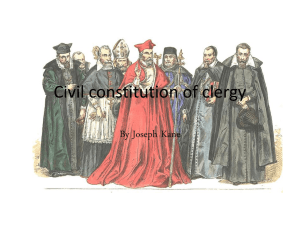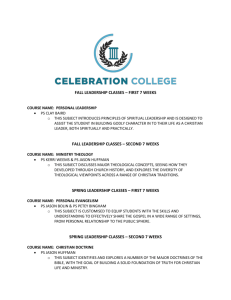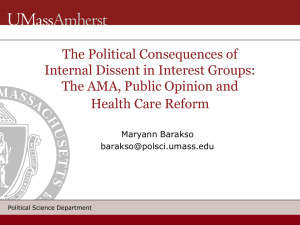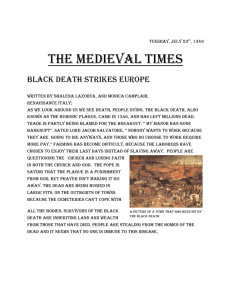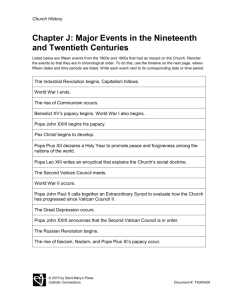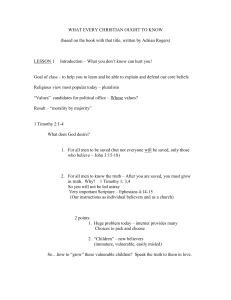Collaborative Ministry in the exercise of
advertisement
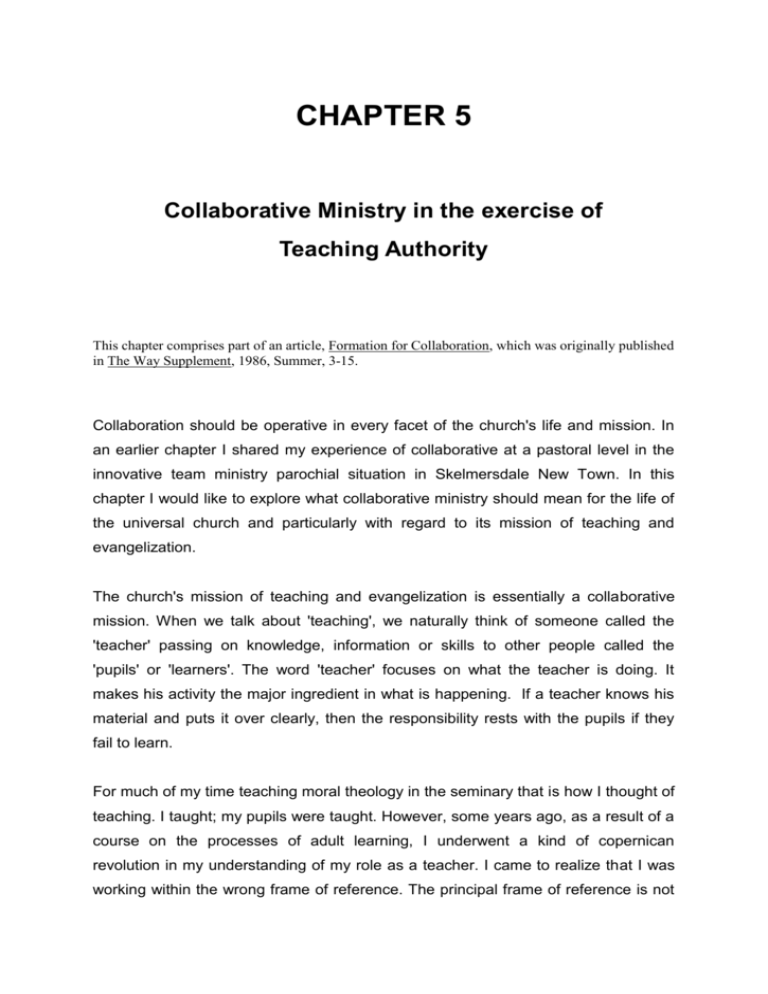
CHAPTER 5 Collaborative Ministry in the exercise of Teaching Authority This chapter comprises part of an article, Formation for Collaboration, which was originally published in The Way Supplement, 1986, Summer, 3-15. Collaboration should be operative in every facet of the church's life and mission. In an earlier chapter I shared my experience of collaborative at a pastoral level in the innovative team ministry parochial situation in Skelmersdale New Town. In this chapter I would like to explore what collaborative ministry should mean for the life of the universal church and particularly with regard to its mission of teaching and evangelization. The church's mission of teaching and evangelization is essentially a collaborative mission. When we talk about 'teaching', we naturally think of someone called the 'teacher' passing on knowledge, information or skills to other people called the 'pupils' or 'learners'. The word 'teacher' focuses on what the teacher is doing. It makes his activity the major ingredient in what is happening. If a teacher knows his material and puts it over clearly, then the responsibility rests with the pupils if they fail to learn. For much of my time teaching moral theology in the seminary that is how I thought of teaching. I taught; my pupils were taught. However, some years ago, as a result of a course on the processes of adult learning, I underwent a kind of copernican revolution in my understanding of my role as a teacher. I came to realize that I was working within the wrong frame of reference. The principal frame of reference is not 'teaching', but 'learning'. Our main concentration must be on the learning process. If no learning occurs, no real teaching is taking place, however well a teacher might think he or she is teaching and however excellent their material might be objectively speaking. A firm grasp of this point is crucial if we are to understand the church's mission to teach (and evangelize) as essentially a collaborative venture. The church is not a community divided into two groups, the teachers (the pope and the bishops) and those who are taught (the rest of us). That kind of presentation was a nineteenth-century innovation and went very much against the more traditional and biblical notion which saw 'learning' and 'teaching' as two activities involving the whole church. As Christians we are all learners and as Christians we are also all teachers. Unpacking that statement might help us to appreciate the collaborative nature of christian teaching. As Christians we are all learners. This immediately calls to mind the words of Jesus, 'You must not allow yourselves to be called teachers, for you have only one teacher, the Christ' (Mt 23,10). We are all believers. We are all equally dependent on the Lord for the gift of faith, be we pope or peasant. At this level we are all equal. In fact, at this level, strange though it might sound, we all share equally in the charism of infallibility. This is the infallibility of the church in believing.1 There is a certain dynamic element at work in any group gathered together to share in a learning experience. In the church it is the Holy Spirit who is the dynamic element in the learning process. That is why the church needs to have a basic trust and confidence in its internal learning process and should allow it to take its natural course. The heart of this learning process does not lie in the passing on of correct teaching from one generation to the next. Revelation is not a block of objective knowledge which was committed to the apostles by Jesus and which is passed down from age to age. Bishop Butler remarks that 'a revelation is not fully given until it is received'. 2 In other words revelation is a living reality which occurs in every generation in the 1 2 cf Lumen Gentium, n 12. cf.The Theology of Vatican II, (London, 1967), p. 36. sense that the process of self-discovery in Christ has to be worked through by the church in every age and in each culture.3 The Word of God being received and appropriated in each generation is the living process of revelation. As Christians we are all teachers. There is a sense in which that is true within the learning community of the church. We all share our faith with each other and thus help on the growth process in the body of the church - parents, teachers and catechists doing this in a very crucial way. By virtue of our baptism we also share in the missionary function of the church. 'Go and teach all nations' is a word of the Lord spoken to all of us. This is put forward very forcefully by Paul VI in his Apostolic Letter, Evangelization in lhe modern world, following the 1974 Synod of Bishops. He writes: 'Here lies the test of truth, the touchstone of evangelization: it is unthinkable that a person should accept the Word and give himself to the kingdom without becoming a person who bears witness to it and proclaims it in his turn' (n 24). In this letter the pope seems to opt for the learning frame of reference rather than the teaching one. 'In fact, the proclamation only reaches full development when it is listened to, accepted and assimilated, and when it arouses a genuine adherence in the one who has thus received it' (n 23). Therefore, in our role as teachers, as evangelizers, we need to be very aware that the core of evangelization does not lie in what we do but rather in what happens in the hearts and minds of those with whom we are trying to share the gospel. We are not defending the gospel against the enemy; we are sharing it with people who deep down in their being are hungry for the word of God. Where does the teaching authority of the pope and the bishops fit into all this? Again it depends on whether one adopts the teaching frame of reference or the learning one. If one goes for the former, both the pope and the bishops are thrust into an impossible position. To be competent teachers they would need to be one-man universities embodying in themselves all the expertise of theological, biblical, moral, philosophical, pastoral and historical disciplines. That kind of teaching competence would be humanly impossible. However, it is completely different if learning is 3 cf Gaudium et Spes, n 44. accepted as the prime process. Then teaching is seen as a leadership role within (not outside) the learning process. The teacher remains one hundred per cent a member of the learning community but his function is to facilitate the learning process within the community. Let us try to explore what are the main functions of teaching authority within the church if it is interpreted according to the learning frame of reference? First of all, a 'learning' teaching authority will be conscious that ultimately there is one teacher in the christian community and that is the Holy Spirit, the life-giving spirit of truth which Christ has breathed into his church. This Spirit permeates the whole church and so the teacher, whether he be pope, bishop or head of the Congregation for the Doctrine of the Faith, should not see himself as the repository of all wisdom and knowledge or as having some kind of 'hot-line' to God. He will see himself very much as a listener, trying to discern all the riches of the Spirit's wisdom coming through different members of the community. And when he discerns the voice of the Spirit, coming from whatever quarter, he will see it as part of his role to enable that voice to be heard as widely as possible in the church. Secondly, a 'learning' teaching authority today will be open to the riches of the church's self-understanding as articulated in Vatican II and so will be conscious that the Spirit-guided learning community must not be restricted to the Roman Catholic church. Speaking of non-Catholic Christians, Lumen Gentium (n 15) says that 'to them also the Holy Spirit gives his gifts and graces and is therefore operative among them with his sanctifying power.’4 (Cf also Decree on Ecumenism, n.3). And even outside the gathering of christian believers, the learning process is going on and the Spirit of God is active. This is implicit in Vatican ll's Declaration on the relationship of the church to non-Christian religions. Moreover, speaking of the whole movement among peoples directed towards promoting deeper respect for the human person, Gaudium et Spes (n 26) comments: 'God's Spirit, who with a marvellous providence directs the unfolding of time and renews the face of the earth, is present in this evolutionary process'. (The phrase 'is not absent from' in the Abbot translation does not do justice to 'adest' in the latin text). So if the church is to exercise a teaching 4 cf also Decree on ecumenism, n 3. function in the world, it must first play a listening role since in every age and culture the heart of revelation must be clothed in the best riches of the world's true selfunderstanding.5 A third element in the role of the 'learning' teaching authority is the willingness to join in dialogue. Dialogue is an essential part of teaching according to the learning model. It is a dialogue partly directed towards listening and learning and partly towards sharing one's own beliefs and convictions. Dialogical teaching does not need to claim certainty for all its utterances. There can be a danger in the church of thinking that all pronouncements by teaching authority ought really to be infallible or at least one hundred per cent certain! Since pronouncements relevant to current issues can hardly be infallible, the church is forced into a 'Catch 22' situation - either it keeps a deafening silence or else it claims a level of' authority for its statements which they will not bear. This need riot be the case if a teaching pronouncement is offered as a dialogical contribution within the learning community. A strong, wellpresented and carefully agreed statement which tries to express as well as possible christian thinking on a current issue can play an important role in the dynamic of the learning community. The Peace and Economic Pastoral letters of the United States bishops are a striking example of this process in action.6 A fourth element in the role of the 'learning' teaching authority in the church will be the function of articulating the community's grasp of the truth when this has emerged with sufficient clarity and agreement. This, too, demands attentive listening and careful discernment. Part of this listening and discernment will be directed towards earlier teaching. In saying this I am not suggesting that teaching cannot develop or even change. There is no denying the possibility of development of doctrine or even of change of teaching when we have outgrown mistaken notions in certain matters related to the truths of christian faith. This has happened, for example, with regard to some aspects of our understanding of human sexuality with the consequence that the teaching of Vatican II shows a definite change from the teaching of the patristic 5 cf Gaudium et Spes, nn 44 and 58. cf. In my recent book, New Directions in Sexual Ethics: Moral Theology and the Challenge of AIDS, London, Geoffrey Chapman, 1998, pp.96-99 I have suggested that it can sometimes be helpful to interpret some authoritative teaching statements on specific ethical issues as important contributions to an on-going conversation 6 age and succeeding centuries. Nevertheless, we cannot deny our past. If our teaching has developed or even changed, this must be acknowledged and the reasons for it be understood. We are unfaithful to christian tradition if we refuse to accept the possibility of development or change. Christian tradition is something alive and active. Healthy development and change is collaboration with our christian forbears, since it is keeping alive the tradition they handed on to us. Would it be fair to say that a fifth element in the role of teaching authority is the function of prophet? If by prophecy we mean a special gift of being able to interpret the signs of the times, I would not link that necessarily with the role of the teacher, even though I would gladly admit that many teachers in the church have exercised this prophetic gift. I would prefer to say that part of the teacher's role is to listen for the voice of the prophet and then enable that voice to be heard as widely as possible. The calling of Vatican II by Pope John XXIII was a classic example of this. Perhaps John XXIII was not a prophet himself but by calling the Council he enabled the voices of some of the great prophets of our day to echo round the whole church and far beyond as well. I would even dare to say that John XXIII’s summoning the world’s bishops together for the Second Vatican Council (accompanied by their theological consultors) was the most important exercise of teaching authority this century. What about dissent from authoritative teaching in the church? Provided it is not touching the heart of our christian faith and so dealing with truths believed and taught infallibly, there is room for dissent. Even here of course, the way we interpret dissent will depend on whether we are thinking within the teaching or the learning frame of reference. In the teaching model, dissent is seen as a rejection of the teaching put forward - 'You, the teacher, are wrong. You are in error'. Understood in this way dissent usually involves confrontation between teacher and taught. Nevertheless, traditional theology allows for such dissent in exceptional circumstances, though it was thought that it would only happen rarely. In the learning model, dissent is not a confrontation with the teacher. It is much more an expression of collaboration in the church's teaching. It is claiming that the articulation of this teaching put forward by the teacher does not do justice to the full riches of what the church really believes. A good indication as to whether a particular act of dissent is justified will be found in the reaction of the rest of the community, especially those most intimately involved in that specific issue, whether as practitioners or as teachers. That is why the 'non-reception' of some of the church's teaching on sexual and marital issues cannot be dismissed too easily. As Cardinal Hume said at the 1980 Synod of Bishops, the experience of christian married couples is a genuine source for the church's exploration of the theology of marriage. Collaboration in the church's mission of teaching and evangelization is a privilege and responsibility of us all. The church will be truly honouring collaboration in this aspect of its mission when the voice of the Spirit is heard and listened to, through whomsoever it speaks and from whatever unlikely quarter it might come. 2,522 words
